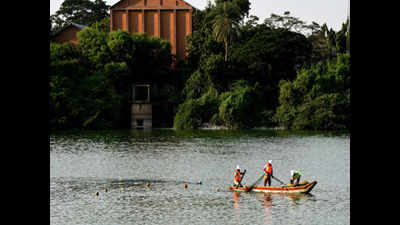- News
- City News
- chennai News
- In drought-hit city, ICF lake in Villivakkam remains an oasis
Trending
This story is from June 15, 2019
In drought-hit city, ICF lake in Villivakkam remains an oasis
At a time when a majority of the waterbodies in the city are bone dry, the lake in Villivakkam, opposite to the administrative headquarters of the Integral Coach Factory (ICF), is brimming.

The ICF lake, measuring about 1,500ft x 900 ft on the surface, sprawls over 25 acres and is 24-foot deep. It has a capacity of 8.5 lakh cubic metres of water
CHENNAI: At a time when a majority of the waterbodies in the city are bone dry, the lake in Villivakkam, opposite to the administrative headquarters of the Integral Coach Factory (ICF), is brimming.
It is not by luck or chance; focused efforts and a sizeable amount of money have gone into a plan to rejuvenate the lake, which was till 18 months ago, a cesspool.
A senior official said the lake currently has four feet of water and some exotic birds were seen frequenting it recently.
The lake has been in existence since the 19th century, before the inception of ICF. It measures about 1,500X 900 feet on the surface. It is spread over 25 acres and is 24 feet deep. It has a capacity of 8.5 lakh cubic metres of water.
The previous general manager S Mani had taken a keen interest to revitalise the water body in an eco-friendly manner. Sources said surveys were conducted and it was planned to remove the sludge in the water using dredges.
An unauthorized drain that led to the lake was blocked and sullied water from the nearby residential area was diverted to a canal.
To prevent entry of solid waste and to avoid stench, raised filters and sand barriers were provided at the interlinking junction of the canal. This made the vicinity clean and the flow of water was also made uninterrupted. Shrubs on the bund were de-weeded, while boulders and debris on the uneven bank were cleared.
The sludge in the lake was removed using dredges and passed through a series of filters. The recycled water was then let into the lake.
In addition, thick vegetation and dead trees on the banks were removed, dried and crushed and used as manure for the 'green house'. Finally, fresh small fish, which consume algae, were let into the water. Because of this, aquatic life improved and the clean environment made the area eco-friendly.
"The improved quality of water has rejuvenated aquatic life and has been attracting migratory birds such as pelicans, painted stork, Indian cormorant, ducks, egrets, kingfishers, etc. The area has become a visual delight," an official said.
The extensive project cost 52 lakh and was begun in September 2017. A walker's park with greenery was developed on the southern side of the lake. On the eastern side, apart from a boat jetty, a fruit-cum-herbal garden was developed by trainees and staff of ICF Technical Training Centre.
It is not by luck or chance; focused efforts and a sizeable amount of money have gone into a plan to rejuvenate the lake, which was till 18 months ago, a cesspool.
A senior official said the lake currently has four feet of water and some exotic birds were seen frequenting it recently.
The lake has been in existence since the 19th century, before the inception of ICF. It measures about 1,500X 900 feet on the surface. It is spread over 25 acres and is 24 feet deep. It has a capacity of 8.5 lakh cubic metres of water.
The official said the reservoir was treated through a filtration unit and water was supplied for drinking to nearby colonies till the 1950s. Later, it became polluted and supply of water for drinking was discontinued. However, it was used for loos, fire-fighting and gardening.
The previous general manager S Mani had taken a keen interest to revitalise the water body in an eco-friendly manner. Sources said surveys were conducted and it was planned to remove the sludge in the water using dredges.
An unauthorized drain that led to the lake was blocked and sullied water from the nearby residential area was diverted to a canal.
To prevent entry of solid waste and to avoid stench, raised filters and sand barriers were provided at the interlinking junction of the canal. This made the vicinity clean and the flow of water was also made uninterrupted. Shrubs on the bund were de-weeded, while boulders and debris on the uneven bank were cleared.
The sludge in the lake was removed using dredges and passed through a series of filters. The recycled water was then let into the lake.
In addition, thick vegetation and dead trees on the banks were removed, dried and crushed and used as manure for the 'green house'. Finally, fresh small fish, which consume algae, were let into the water. Because of this, aquatic life improved and the clean environment made the area eco-friendly.
"The improved quality of water has rejuvenated aquatic life and has been attracting migratory birds such as pelicans, painted stork, Indian cormorant, ducks, egrets, kingfishers, etc. The area has become a visual delight," an official said.
The extensive project cost 52 lakh and was begun in September 2017. A walker's park with greenery was developed on the southern side of the lake. On the eastern side, apart from a boat jetty, a fruit-cum-herbal garden was developed by trainees and staff of ICF Technical Training Centre.
End of Article
FOLLOW US ON SOCIAL MEDIA










